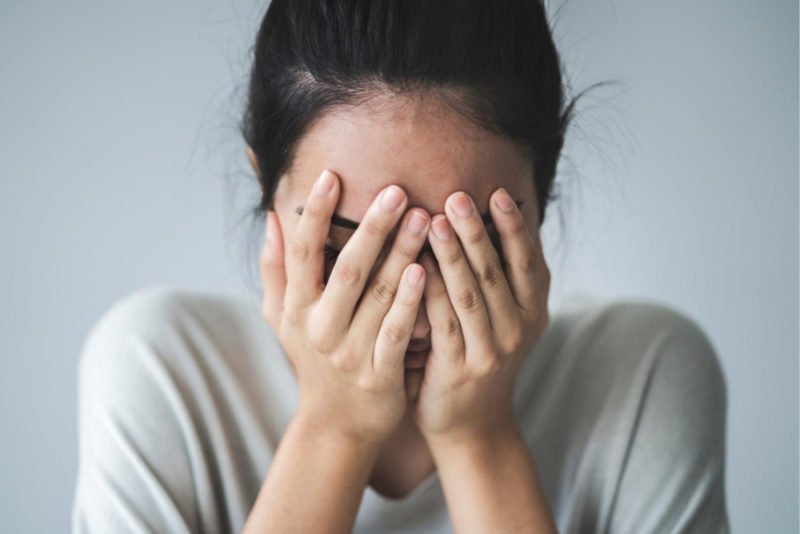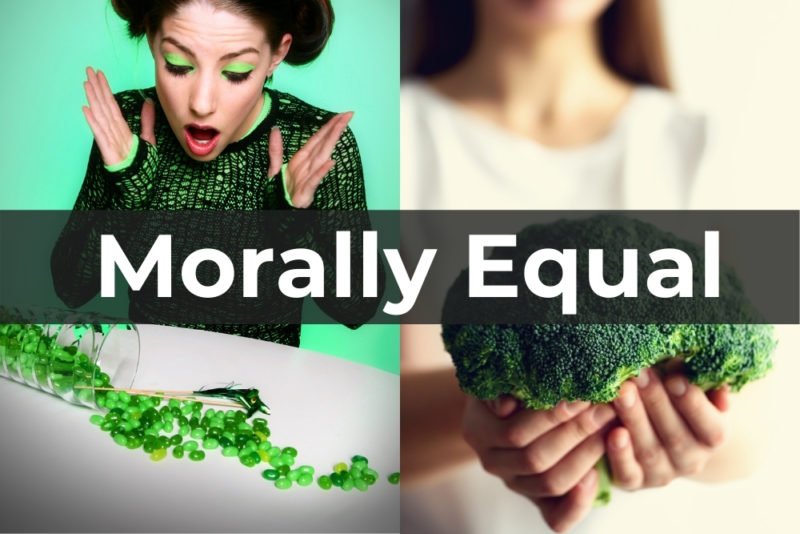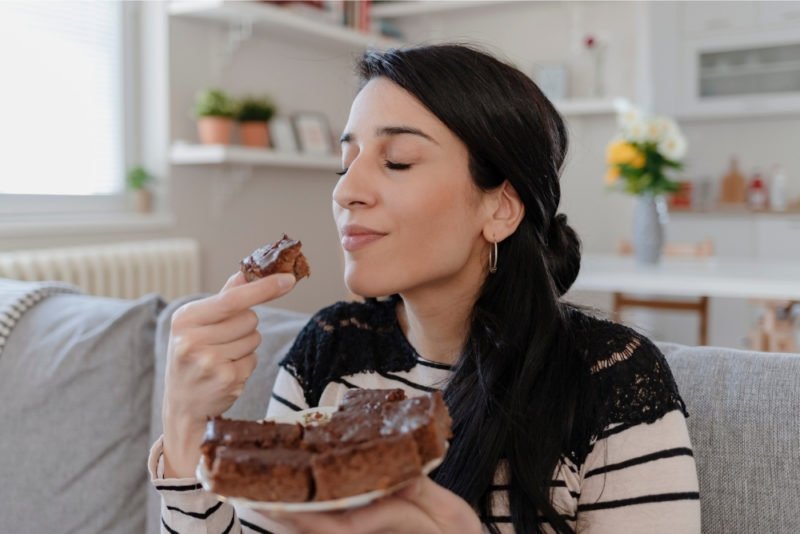
When you think of chocolate cake, what word comes to mind…guilt, or celebration? If you’re American, you’re more likely to say “guilt.” If you’re French or Belgian, you’re more likely to say “celebration.” If you’re Japanese, you’re somewhere in between.
That distinction was uncovered in a 1999 research study, and subsequent research suggests that people associating chocolate cake with guilt are no more likely to eat healthfully than those who associate the cake with celebration. The researchers did not find any evidence of “adaptive or motivational properties of guilt.” In other words, the guilt was for naught.
People may feel guilt for a variety of reasons, including for acts they have committed (or think that they committed), a failure to do something they should have done. If you’ve caused harm to someone, guilt is a natural emotional response, and it can motivate us to apologize or to correct or make up for a wrong—or to avoid causing harm in the first place. So in that respect, guilt is a helpful emotion. But in excess, guilt can be a useless burden. Especially when it comes to chocolate cake.

Why do you feel guilty?
When we eat something that we think we shouldn’t be eating, it’s not necessarily that we’re concerned that we’ve harmed our health. It’s more likely that we feel that we’ve had a willpower “fail.” We’ve bumped into one of our food rules.
If you feel guilty for going to town on the jar of peanut butter, it’s probably not because you have a raging peanut allergy and you don’t know where your EpiPen is. No, you’re probably having thoughts like “peanut butter is high in fat” or “I can’t believe how many calories I ate.” When we eat a “bad” food, we’re bad, weak and unworthy. When we eat a “good” food we’re good, strong and worthy.
In other words, we’re moralizing about food. But here’s the thing — food doesn’t have moral value.
An apple and a slice of apple pie aren’t nutritionally equal, but they are morally equal. Green jelly beans and broccoli aren’t nutritionally equal—despite both being green—but they are morally equal. You’re not going to feel great physically if you always opt for the apple pie and the jelly beans (and, yes, over time you would probably be harming your health), but you’re not going to feel mentally great if you never let yourself have a slice of delicious apple pie, or some jelly beans, if those are foods you enjoy.
So unless you stole that apple pie or those jelly beans, you have nothing to feel guilty about. If you realize that your main four food groups are apple pie, green jelly beans, oatmeal cookies and strawberry ice cream, you are not a bad person but you objectively are not nourishing your body well, so that’s worthy of some self-examination. (“How do I feel physically eating this way?” “What are obstacles to eating a more varied diet that includes more nutrient rich foods?) It’s not worth shame or self-hatred.

So you feel guilty—what now?
You’ve done the deed, you’ve eaten the “bad” food, and now you are awash in guilt. Where do you go from there?
- Do you go into a shame spiral? Whereas guilt is the feeling that goes with the thought “I MADE mistake,” shame is the feeling that goes with the thought, “I AM a mistake.” A shame spiral happens when you are unable to control or stop your self-loathing. For example: “I can’t believe I just ate that. I am disgusting. I have no willpower. I’m going to ruin my health and die alone.” (OK, that was a little extreme, but you get the idea.)
- Do you decide “in for a penny, in for a pound”? In other words, “I can’t believe I ate five cookies! I’m so bad. I might as well eat the rest of them, so that they’re not in the house anymore.”
- Or…do you use this as an opportunity for exploration? Why do you feel guilty? Did you truly do harm? No, really, did you? What “rules” did you break? Why do you have those rules…what’s the purpose? Are the rules rooted in self-care, or self-control.

Questions to ask yourself, and some possible answers
So back to the title of this post: is food guilt ever a good thing? It can be, but not in the way we usually think. No, guilt is not an effective motivator, but if when we are aware of our guilt, and we can turn inward with compassion and curiosity, we might glean important information about our relationship with food that can lead to positive change.
If you feel guilty about the food itself:
- Do you feel conflicted about how you eat, generally, and that one particular food was the “straw that broke the camel’s back”? It’s possible that you could benefit from improving the nutritional quality of your diet, but guilt and shame are not the best motivators.
- Do you strive to eat very healthy (perhaps even following a “clean eating” plan), and this food did not meet your strict standards? The guilt you feel might be the “canary in the coal mine” that you are struggling with orthorexia, and you might benefit from relaxing your diet.
If you feel guilty about the amount of food you ate:
- Did you allow yourself to become overly hungry? When you’re ravenous, it’s hard to notice when you’ve had “enough,” and cross over to the point of feeling uncomfortably full.
- Were you distracted while you were eating? This is also a recipe for missing the early signs of fullness, leading to unintentional overeating.
- Were you trying to comfort yourself? There’s no shame in needing comfort, but it’s generally helpful to consider whether food is the best (or only) option to make yourself feel better. Sometimes it is, but sometimes you will have another coping tool at your disposal that might be more effective at helping you feel better.
If this is an area you need to explore, I encourage you to check out one of my previous posts, “How food guilt gets in the way of mindful eating.” It’s a good read, and it has more tips and ideas for gentle inquisition and exploration.
And…if you want to see food guilt gone really, really wrong, this Amy Schumer sketch is a classic. (Note: Please don’t watch it if you are easily offended, because it is intentionally offensive, in order to make a point. This is also probably NSFW…for those of you who still work amongst others).
Disclaimer: All information provided here is of a general nature and is furnished only for educational purposes. This information is not to be taken as medical or other health advice pertaining to an individual’s specific health or medical condition. You agree that the use of this information is at your own risk.
Hi, I’m Carrie Dennett, MPH, RDN, a weight-inclusive registered dietitian, nutrition therapist and body image counselor. I offer compassionate, individualized care for adults of all ages, shapes, sizes and genders who want to break free from eating disorders, disordered eating or chronic dieting. If you need to learn how to manage IBS symptoms with food, or improve your nutrition and lifestyle habits to help manage a current health concern or simply support your overall health and well-being, I help people with that, too.
Need 1-on-1 help for your nutrition, eating, or body image concerns? Schedule a free 20-minute Discovery Call to talk about how I can help you and explore if we’re a good fit! I’m in-network with Regence BCBS, FirstChoice Health and Providence Health Plan, and can bill Blue Cross and/or Blue Shield insurances in many states. If I don’t take your insurance, I can help you seek reimbursement on your own. To learn more, explore my insurance and services areas page.
 Print This Post
Print This Post






